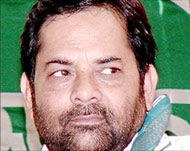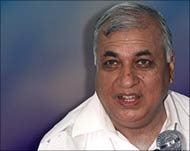Indian Muslims politically under-represented
Never judge a book by its covers. The Who’s Who of the Indian parliament might begin and end with Muslim names but in between it tells a story of the community’s exclusion from political life.

There are just 32 Muslims in the 544-member people’s house of parliament, which, according to community leaders, is a “gross under-representation, fraught with serious consequences both for the community and the country”.
Muslim participation in the political process, with parliament as its barometer, has been declining with every election, both in terms of their overall and proportional representation.
Moreover, as the next parliamentary election in India draws close, intellectuals and politicians have begun to worry about the shrinking political space for the country’s 140 million Muslims.
Least secure
“Muslims are India’s largest but least secure religious minority because they are spread thinly across the country and terribly under-represented in the political mainstream,” says Prof Basir Ahmad Khan, associate professor in Islamic studies at Delhi’s Jamia Hamdard University.
“They also bear the burden of history that saw a bloody partition of India along religious lines. Muslims feel defensive and self-conscious about organising themselves as a political force.”
 |
|
Basir Khan: Muslims feel |
He adds that Muslims have little choice but to be politically organised “because political representation and safety, both physical and psychological, go hand in hand”.
Anis Durani, a politician in the Indian National Congress, India’s oldest party that has ruled the country for 45 of the 56 years since independence, agrees with Prof Khan.
“In a secular, democratic and just society all sections of the population should be involved in the political process; under-representation of any people is harmful, both for society and those who don’t have a voice in the political mainstream.
“Those who chose India, a secular democracy, over a theocratic and Muslim Pakistan find themselves at the receiving end even 55 years hence and something has to be done to end their mental siege,” he says.
Common problem
The concern over the declining representation of Muslims in parliament and state legislative assemblies cuts across party lines although analysis of the problem differs.
According to Mukhtar Abbas Naqvi, general secretary and spokesman of the Bharatiya Janata Party (BJP), the leading partner in the ruling federal coalition:
“The Muslim participation in the political mainstream has come down thanks to the so-called secular parties like the Congress who have been exploiting them as mere vote banks, and have been appeasing the fanatic Muslim leaders at the cost of the community.”
Congress’s Durani, however, contests this: “There were 46 Muslims in the Indian parliament during the Congress [party] rule under Indira Gandhi and 42 when Rajiv Gandhi was prime minister. Now when the BJP coalition is ruling the country we have only 32.”
Naqvi, the Congress leader points out, is among the few Muslims in the BJP.
“The BJP Muslims, regardless of the positions given to them, are just showpieces but the Congress has never treated them like that,” says Durani.
 |
|
Naqvi is among a few Muslims |
Durani’s party prides itself on its secular credentials and on having zealously guarded the interests of religious minorities. However, many political analysts believe that it has not done enough for Muslims.
“During the first decade of free India’s history, the non-Muslim voters were the least biased against Muslims and this was the worst phase of Muslim representation proportionate to their population,” according to academician-author Iqbal Ansari.
Election history
Ansari, who recently carried out a study on the subject, says that for the first three elections between 1952 and 1967, an average of 5.21 Muslims were represented in parliament and state legislative assemblies against their average population of 10.17%.
“As it was the Congress party which was their main political forum, the major share of blame for the high Muslim deprivation during this period goes to the Congress,” he says.
Ansari, however, is only talking about proportional representation of Muslims in the political mainstream.
In terms of the overall record, Muslims were much more visible during Congress rule than under any other government.
According to Prof Khan, “The corruption in the Congress secular ideology in the last 15 years and its negative impact on the community’s sense of security notwithstanding, the Congress regime led by Indira Gandhi was the best for India’s Muslims in recent political history.
“The country had eight Muslim chief ministers and only one out of these eight states, Jammu and Kashmir, has a Muslim majority. Such a scenario is unthinkable in today’s communally polarised atmosphere,” he says.
 |
|
Arif Khan prefers to be known as |
He believes that the time has come for Indian Muslims to “stop shuttling between the Congress and the BJP and to go beyond the role of king-makers”.
“Today, you name any caste or community with a sizeable population and it has a recognised political party to represent it both in the state assemblies and parliament, but Muslims are the only community in the country who contest and win elections on their own steam but borrow the label of other political parties, except in Kerala.
“The Muslim politicians’ fondness for the dog collar of main parties must go for them to get their due share in the power structure,” he says.
Caste and communal alignments, he underlines, are a fact of life in India and, regardless of the numerical strength, a bridge to power.
Support
“Look at [the] Samajwadi Party that represents the interests of [the] 6-7% Yadav [population] but, by wooing the Muslim voters, has twice come to power in Uttar Pradesh. As the fourth largest party in parliament, it can also make or break a government.
“The Samajwadi Party would be nowhere near power without the support of Muslims. So, why shouldn’t the Muslims launch themselves as a political party?” he asks.
Khan points to the Indian Union Muslim League (IUML) in the southern state of Kerala as an ideal example of political power translating into empowerment of the community.
The IUML is a member of the Congress-led ruling coalition in the state and has shared power in Kerala for about three decades.
“Muslims of Kerala are among the most progressive in the country. Political loyalty to a party that represents their interests exclusively certainly does not contradict loyalty to the country,” Khan says.
He also advocates the need for a similar party in north India, especially in states where there is a large population of Muslims.
“Thanks to IUML there are 12% [placement] reservations for Muslims in educational institutions in Kerala, and education is the main boost to their social status. But it would not have been possible without political force,” he points out.
 |
|
Arif Khan was involved in relief work in Gujarat |
The professor says he cannot relate to a politician like Arif Muhammad Khan who does not want to be “branded”. Khan wants a more broad-based identity as a political rather than as a “Muslim leader”.
A liberal and scholarly politician, Khan quit the late Rajiv Gandhi’s cabinet in 1986 against the enactment of the Muslim Personal Law. Such a law, he argued, only appeased “fundamentalist Muslims” and harmed the interests of the lay Muslim majority.
Because of his political stance, Khan commanded popular support even in Hindu-majority areas until a few years ago. Lately, however, he has been in the news as a Muslim politician groping for a political identity.
His association with the Bahujan Samaj Party (BSP), representing Dalits, traditionally the most neglected and exploited social group but today a formidable political force, ended when the BSP joined hands with the BJP to form a government in Uttar Pradesh.
This came soon after the communal carnage in Gujarat early last year.
Khan, who was among the Muslims involved in the relief and re-habilitation work in Gujarat. He quit the BSP over its alliance with the BJP.
Today, the same BJP is trying to woo him. In a stark reminder of the dilemmas facing some Muslim politicians, Khan has not categorically closed the option of joining the BJP.
Ground rules
“Today, no Muslim politician can escape the ground rule that a Muslim candidate, be it of any party, can win elections only from Muslim-dominated constituencies.
“When the electorate is sharply polarised along caste and communal lines it would take a foolish dreamer to think otherwise,” says Prof Khan.
Congress and BJP leaders both confirm his opinion.
|
“There are reservations for other disadvantaged groups like Dalits and women; why not for us?” Anis Durani,politician, INC |
“Hindu candidates, regardless of the party they represent, can win even in a Muslim-dominated constituency but no Muslim can hope to win in a largely Hindu constituency unless it’s an exceptional setting of a metropolitan constituency and the candidate has a long association with it,” says Durani.
The BJP’s Naqvi also concedes the point. He admits that he owes his seat in parliament to being a Muslim and the sizeable population of Muslims in his constituency.
“Political parties are not charitable missions and have to gauge the winning chances of a candidate which do depend upon religious and caste make-up of a constituency” says Naqvi.
Moreover, it is precisely because of this that those worried about the shrinking participation of Muslims in the political mainstream want reservations for them in parliament and legislative assemblies.
“There are reservations for other disadvantaged groups like Dalits and women; why not for us?” says Anis Durani.
The government has not even considered the question so far, but that does not stop the Muslim leaders from campaigning independently together for it.
And, as they review their options, there could be no better time for Muslim politicians to campaign than close to the parliamentary elections.